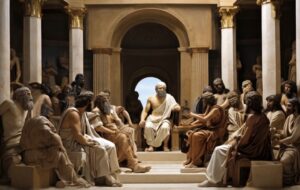Morality emerges not as an aberration but as an integral component of our evolutionary blueprint, a facet convolutedly woven into the fabric of our minds, which are far from being solely objective and rational entities. If the roots of morality do not lie predominantly in reasoning, then it follows that a blend of innate predispositions and social learning shapes our moral landscape. In this essay, I endeavor to elucidate how morality is both an inherent trait and a learned characteristic. We enter this world predisposed to righteousness, yet the specifics of what constitutes righteous behavior in our respective cultures require cultivation and understanding.
Our inherent propensity for moral judgment has uniquely equipped humanity, unlike any other species, to forge vast cooperative entities—tribes, societies, and nations—unbound by the ties of kinship. Simultaneously, however, this very propensity ensures that these collectives are perennially entangled in the thorns of moralistic conflict.
The reality is that our moral intuitions precede deliberate, strategic reasoning. Our minds operate in a realm of instantaneous and perpetual evaluation, heavily reliant on swift, intuitive judgments, particularly in the spheres of social and ideological discernment.

One might ponder the peculiar construction of our mental architecture. As hominid brains expanded remarkably over five million years, developing sophisticated language and enhanced reasoning capabilities, why did evolution favor the emergence of an ‘inner lawyer’ rather than an ‘inner judge’ or ‘inner scientist’? The crux of this query hinges on whether truth or reputation was deemed more crucial for the survival of our ancestors.
To grasp the complexities of our ‘righteous mind,’ one must first acknowledge the diversity of moral perspectives across the globe and even within individual societies. The next step lies in comprehending the genesis of these varied moral frameworks.
Scientific investigations reveal that social class exerts a more significant influence than geography or cultural background. For instance, the well-educated populace of most Western cities shares more in common with each other than with their less affluent neighbors.
The moral domain is not uniform; it varies across cultures. In Western societies, where education and individualism are prevalent, the moral spectrum tends to be narrowly defined. In contrast, sociocentric cultures extend the boundaries of morality to govern and embrace a wider array of life’s facets.
Often, people experience visceral reactions—particularly those related to disgust and disrespect—that can steer their reasoning. In such instances, moral reasoning may emerge as a retrospective rationalization.
The construction of morality cannot be solely attributed to the evolving comprehension of harm by children. Instead, cultural learning and guidance play a more substantial role than is typically accorded by rationalist theories.
Our initial judgments are often formed with haste, and we exhibit a marked reluctance to seek evidence that might contradict these early assessments. Consequently, if one aspires to alter another’s stance on a moral issue or belief, it is imperative to engage their primal mind first. Presenting an argument that contravenes an individual’s innate intuitions typically prompts a fervent search for an escape clause—a rationale to question the argument or conclusion.

Approximately one in a hundred men (and a significantly smaller proportion of women) are classified as psychopaths. While most are not inclined towards violence, those who are perpetrate nearly half of the gravest criminal offenses. This observation underscores a simple yet profound lesson: the conjunction of reasoning ability with an absence of moral emotions is perilous. Psychopaths, adept at articulating whatever facilitates their desires, represent a genetically inheritable condition. Their minds, unaffected by the needs, suffering, or dignity of others, exemplify the dangers of detached rationality.
The innate ability to evaluate individuals based on their social interactions is a universal, untaught capacity. Even infants quickly discern who treats them kindly and observe the conduct of others towards their peers, often developing a preference for benevolent individuals over their malevolent counterparts. Insights gleaned from studies on infants and psychopaths reveal that moral intuitions surface early in life and are fundamental to moral development. Reasoning emerges later, and when it is not accompanied by moral intuition, the outcomes can be distressing.
In Plato’s “Republic,” Glaucon, Plato’s brother, challenges Socrates to demonstrate that justice itself, not merely the reputation for justice, is the path to happiness. Glaucon prompts Socrates to consider the case of a man possessing the mythical ring of Gyges, a gold ring granting invisibility at will. Glaucon’s thought experiment insinuates that people are virtuous primarily due to fear of repercussions, especially concerning their reputation. He remains unconvinced until Socrates can prove that a just individual with a tarnished reputation is happier than an unjust one with a favorable public image.
Socrates accepts this formidable challenge, drawing parallels between justice in an individual and in a city. He suggests that a just city is characterized by harmony, cooperation, and fair division of labor. Socrates argues that these same principles apply to a just, harmonious, and content individual. In this analogy, reason, akin to a just ruler, governs the contented person. If reason prevails, it concerns itself with true virtue, not merely its appearance. Plato’s philosophy encompassed a cohesive set of beliefs about human nature, central to which was his conviction in the perfectibility of reason. He maintained that reason, our inherent nature, should lead us towards the righteous path, not merely the popular one.
Regrettably, the extensive subsequent acquisition of knowledge by humanity does not affirm the perspectives of Socrates or Plato. It appears that reason was primed more for the pursuit of justification than truth. Glaucon’s insights prove to be more accurate: the vast majority of individuals place significantly greater emphasis on appearances and reputations than on the essence of reality.
Glaucon’s acumen in understanding human nature was profound. He recognized that the most crucial element in crafting an ethical society lies in ensuring that every individual’s reputation is perpetually at stake, thereby ensuring that misconduct invariably results in adverse consequences.
To distill this concept further: if you believe that moral reasoning has been honed by natural selection to guide us towards truth, enabling us to discern the correct course of action and to censure wrongful behavior, then you align with the rationalist school of thought, as epitomized by Plato and Socrates. Conversely, if you perceive moral reasoning as a tool refined to advance socially strategic objectives, such as safeguarding reputations and persuading others to lend their support, then your viewpoint resonates with that of Glaucon.

Humans are a species uniquely adept at fostering cooperation beyond the confines of kinship. We fortify this cooperation through systems of both formal and informal accountability. Our proficiency lies in holding others to account for their deeds and adeptly maneuvering in a world where we, too, are subject to scrutiny for our actions. We operate as intuitive politicians, employing conscious reasoning more for the art of persuasion than the pursuit of discovery. This persuasion extends to ourselves, as we often come to believe the assertions we make to others. The reality is that our concern for the opinions of others is profound. The only known exception to this concern for societal perception, as already described, lies with psychopaths, who appear to lack this sociometer entirely.
A renowned researcher in reasoning, David Perkins, has demonstrated that schools do not inherently teach individuals to reason comprehensively. Rather, they tend to select individuals with higher IQs, who are inherently capable of generating a greater number of reasons. Perkins’ research concludes that while IQ is a predominant indicator of argumentative prowess, it correlates primarily with the ability to produce arguments favoring one’s own perspective. Those with higher intellectual capabilities excel as lawyers and PR masters, yet they do not necessarily surpass others in uncovering reasons supporting the opposing viewpoint.
In his insightful work “Predictably Irrational,” Dan Ariely extrapolates from a series of enlightening studies, suggesting that, when presented with the opportunity, numerous individuals who consider themselves honest will engage in deceitful behavior. Rather than discovering a minority skewing the average, Ariely’s studies revealed a majority engaging in minor acts of dishonesty. Thus, when granted the cloak of invisibility, people tend to cheat only to the extent that they can maintain their self-perception as honest individuals. The overarching implication is that most individuals, when presented with invisibility coupled with plausible deniability, are inclined to engage in deceit.
Consequently, the reverence for reason often observed in philosophical and political spheres is somewhat misguided. Our concern for the opinions of others is significant, though much of this concern operates unconsciously and remains hidden from our awareness. In matters of morality, similar to politics, our behavior is often driven by group loyalty rather than selfish motives. We employ our reasoning faculties primarily to bolster the positions of our respective groups.
Thus, our approach to morality and moral education ought to adopt a more realistic stance regarding the capabilities of individuals. It should focus more on the environments and social systems that facilitate sound thinking and conduct. By recognizing the limitations of individual reasoning and the influential role of context, we can more effectively nurture a moral framework that is both realistic and conducive to ethical behavior.
Epilogue: The Delicate Balance of Morality and Reason

As we draw the curtains on this discussion of the knotty interplay between intrinsic morality and learned ethics, it becomes evident that our understanding of right and wrong is a complex amalgamation of nature and nurture. The journey through the labyrinth of human morality reveals a landscape where intuition and reasoning intertwine, each playing its distinct yet interdependent role.
In the grand scheme of human evolution, morality emerges not as a mere byproduct but as a fundamental aspect of our cognitive architecture. It is a prism through which we view the world, colored by both the congenital predispositions we are born with and the cultural quilt we are interlaced into. This dual heritage bestows upon us the unique ability to form vast cooperative networks beyond the bounds of kinship, yet it also predisposes us to the pitfalls of moral conflict and division.
Our investigation underscores the necessity of recognizing the limitations of reasoning when divorced from moral intuition. The pursuit of truth, as opposed to mere justification, demands an acknowledgment of the biases and blind spots inherent in our cognitive processes. It calls for humility in our approach to moral and ethical discussions, recognizing that the path to understanding is paved with both introspection and empathy.
As we navigate the complexities of moral reasoning, we must be mindful of the profound influence of social context and cultural learning in shaping our ethical compass. The moral domain is not static but dynamic, expanding and contracting across different societies and within our own individual experiences.
In conclusion, the quest for moral understanding is an ongoing journey, one that requires us to balance the natural instincts we carry within us with the insights and perspectives we gather from the world around us. It is a journey not just of the mind but of the heart, where the true compass of morality lies in our ability to empathize, to question, and to grow beyond the confines of our initial intuitions. As we navigate this course, we are reminded of the words of Socrates: “The unexamined life is not worth living.” In examining our moral beliefs, we not only enrich our own lives but contribute to the sum of human understanding and cooperation.







